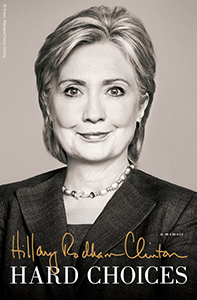Hillary Rodham Clinton’s Hard Choices
Washington correspondent Luiza Ch. Savage on Clinton’s new memoir
Former U.S. Secretary of State Hillary Clinton listens to a question during an event in Chicago, Illinois June 11, 2014. REUTERS/Jim Young (UNITED STATES – Tags: POLITICS HEADSHOT) – RTR3T92E
Share
HARD CHOICES
By Hillary Rodham Clinton
After four years of sleeping on the fold-out sofa of an aging Boeing 757, Hillary Clinton has made peace with the fundamental imperfection of the world. As the top diplomat for a White House sired on hope and change, Clinton’s preferred words are “pragmatic” and “clear-eyed.”
As first lady, Clinton travelled to Beijing in 1995 to famously declare that “women’s rights are human rights.” But, as secretary of state 15 years later, she found herself offering millions of dollars in military aid to prop up a fundamentalist Somali ruler who wanted to impose religious law. (She wondered whether he would shake her hand; he did.)
Her new memoir, Hard Choices, is a story of coming to terms with the world as it is, not as she wishes it would be. It is not the candid tell-all of a veteran leaving the scene and settling scores. (See former defence secretary Robert Gates’s memoir, Duty, in which he “seethes” in meetings and often “hates” his job.) Clinton, who is weighing a second presidential run, is cautious and guarded. But, with ghostwriters and aides, she has pulled together a useful primer on U.S. foreign policy during her four-year, 112-country marathon.
The writing is hardly rousing. (“Copenhagen is a picturesque city, full of cobblestone streets and parks.”) The real drama lies in her struggle to balance America’s “core values,” such as democracy and human rights, with the security interests that often required her to stand side by side with strongmen.
Behind the scenes, she successfully badgers Afghanistan’s president into changing a law that legalizes marital rape, and quietly presses Saudi Arabia to grant a divorce to an eight-year-old girl. Yet she tolerates the Saudi invasion of Bahrain in order to secure Arab jets in the military action to prevent mass slaughter in Libya. The U.S. relationship with China, she explains, doesn’t “fit neatly into categories like friend or rival.”
She regrets her vote in favour of the Iraq War: “I got it wrong. Plain and simple.” But she remains more hawkish than President Barack Obama, urging him to arm Syrian rebels. As the Arab Spring spread from Tunisia to Egypt, the President’s “young” advisers were “swept up” in the euphoria and eager to cut loose dictator Hosni Mubarak, but “I counselled caution.”
She initially offers Moscow a literal “reset button” for U.S.-Russia relations, but later tells Obama, “Strength and resolve were the only language Putin would understand.” She adds: “Not everyone at the White House agreed with my relatively harsh analysis.”
Clinton may not have coined any grand foreign policy doctrines, but she didn’t shrink from the dirty work. “America will always have imperfect partners,” she writes, “and we’ll face imperatives that drive us to make imperfect compromises.”
